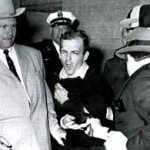
A great "life is so unfair" story. Also, a fine peek into an incident in the history of journalism.
Robert H. Jackson was a photographer working for UPI in 1963, out of its Dallas office. Sometimes History with a capital H comes to one's hometown, as it came to Jackson's in late November of that year.
Jackson's press pass got him into the Dallas police station's basement around noon on November 24, when Oswald was about to be handed over to the sheriff.
Those of you of a certain age surely know where I am going with this. It was Jackson who got THE PHOTO. One that would win him a Pulitzer Prize. You know the image. Oswald had just been shot, the bullet was entering his body. Oswald's face is registering pain and shock. His body is still upright but already crumbling. This photo:

Jackson was not the only photographer who was there that day. The Dallas police had opened up their basement to the press. Another shutterbug there, an employee of the Dallas Morning Herald, was named Ira Jefferson Beers, Jr.
Beers noticed precisely what Jackson did. This stranger lunging his way through the crowd. Both men had good instincts and did their job. Beers was a little bit quicker on the draw then Jackson. That was, for him, unfortunate. He did NOT get the historic shot at just the right moment, the Pulitzer Prize, etc.
Beers got this shot, one reflecting a moment 3/5ths of a second earlier than Jackson's. The gun is out but the bullet is not.
Unless you're a real assassination buff, you probably have NOT seen that one.
So consider: two men in the same line of work. With the same opportunity -- both in that basement at that moment. Both good at their job -- which is why we have these photos.
One famous, the other obscure. Why? Because of 3/5ths of a second. The difference in time cannot be put down to calculation. Jackson didn't say to himself, "I've got to wait just a little bit and see how this plays out before clicking." If he had done THAT, the moment would have been over. Thought is not fast enough to have made the difference. No, this one is luck.
Now, I know some of you are going to think this post exhibits a somewhat skewed sensibility. Life is unfair to widows and orphans. Life was unfair to Jackie and John-John. Compared to that gross unfairness, why concern ourselves with its more nebular unfairness to Beers. Jackson won a sort of lottery and Beers didn't.
Well, if you say so fine ... but ... just 3/5ths of a second.... Dayyum.
Comments
Post a Comment